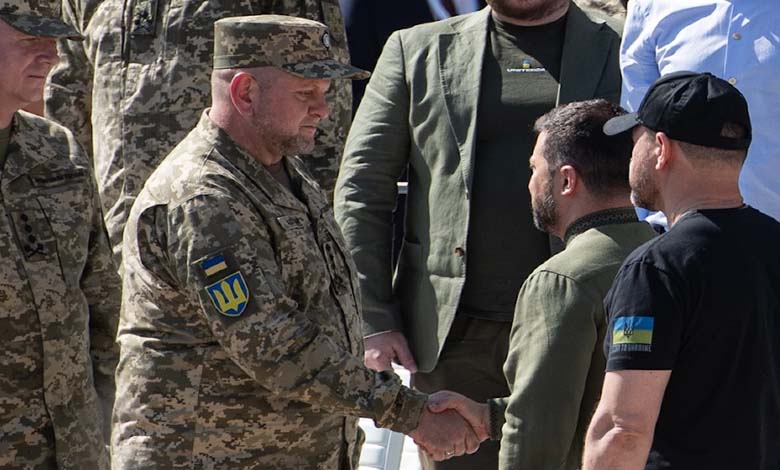Zaluzhny and the waiting game: a general who refuses to conspire against Zelensky but dreams of succeeding him

After more than three years of war in Ukraine, a new figure has come to the forefront of the country’s political scene: former general Valerii Zaluzhny.
In early March, just days after the disastrous meeting between U.S. President Donald Trump and Ukrainian President Volodymyr Zelensky at the White House, the Ukrainian embassy in London became the stage for intense diplomatic activity. U.S. Vice President J.D. Vance sought to arrange a phone call with Ambassador Valerii Zaluzhny. According to diplomatic sources quoted by the British newspaper The Guardian, Vance, apparently searching for possible alternatives to Zelensky, had explored several diplomatic channels. Zaluzhny, after consulting with Zelensky’s chief of staff, declined to take the call.
-
Preparations for a Putin–Zelensky Meeting… and a Gathering of Allied Military Chiefs
-
After a 40-Minute Call… Trump Announces Preparations for a Meeting Between Putin and Zelensky
This incident encapsulates the political dilemma Zaluzhny has faced since his dismissal in February 2024 as Commander-in-Chief of the Armed Forces and his subsequent posting to London. On the one hand, as a disciplined officer, he remains loyal to his government; on the other, many at home and abroad see him as Ukraine’s future president and encourage him to launch a political career.
With Ukraine still at war, elections appear impossible. Yet everyone knows that politics will eventually resume, and when it does, Zaluzhny is expected to pose a real threat to Zelensky, as he currently leads the polls thanks to his military leadership during the early stages of the conflict.
-
Explosive July in Ukraine: Zelensky Reveals the Black Harvest
-
Zelensky Calls for Tougher Sanctions on Russia… Because of Iran
So far, Zaluzhny has made no public statement of political ambition. He rejects most interview requests, and his team carefully manages his public appearances in London to avoid uncomfortable questions.
Still, the Ukrainian embassy in London has become a hub for political visitors: members of parliament, civil society activists, wealthy businessmen, and even Paul Manafort, Donald Trump’s former adviser, who offered his services as a political consultant. Zaluzhny turned down the offer.
-
Zelensky and the Missing Suit… A Battle between War and Diplomacy
-
Why Zelensky’s Resignation Seems Impossible Right Now
Andriy Yermak, Zelensky’s influential chief of staff, also visited London. According to sources, he suggested Zaluzhny join the president’s team. The general declined but pledged loyalty to Zelensky, promising never to criticize him publicly and to inform him first if he ever decided to run for office.
At 48, Zaluzhny was appointed commander-in-chief by Zelensky in July 2021, a decision that surprised many senior officers. Journalist Simon Shuster, in his biography of Zelensky, described him as an ambitious, daring leader, known more for joking with his troops than for strict discipline. This unconventional style seemed to appeal to Zelensky, himself a former comedian turned president.
-
When Clothing Becomes a Weapon… Why Does Zelensky Refuse to Wear a Suit?
-
Washington and Kyiv: Zelensky Bets on “Behind-the-Scenes” Agreements
Yet, on the eve of the Russian invasion, disagreements surfaced between the two men over military preparedness. Once the war began, Zelensky initially entrusted military strategy to Zaluzhny while he focused on rallying international support. The president quickly became a global symbol of resistance, while Zaluzhny earned widespread admiration at home as a war hero.
Over time, however, tensions deepened: almost every strategic meeting ended in disagreement, and Zelensky’s circle grew increasingly wary of Zaluzhny’s soaring popularity. In February 2024, Zelensky dismissed him and sent him to London as ambassador, citing the need for “fresh ideas” in the military—a justification met with skepticism. Zaluzhny accepted the decision without protest.
-
Ukraine Faces an Uncertain Future after a Clash Between Zelensky and Trump
-
Trump, Zelensky, and the Metals Deal: Stakes Far Greater Than the Agreement Itself
Life in London brought unexpected changes. He shared selfies with his wife on the Tube and along the River Thames—images that were poorly received in Ukraine. Nevertheless, he maintained close contact with military leaders. In private, he never confirmed any political plan but occasionally allowed speculation about a possible campaign.
The White House episode further highlighted his balancing act. Even when courted by Trump’s allies, Zaluzhny refused to align with them, reasoning that, despite his tensions with Zelensky, “Ukraine had been humiliated and needed to remain united.” This stance frustrated some Zelensky opponents in Kyiv, who considered Zaluzhny their best chance for political change.
-
Ukraine without America: Zelensky Talks About “Slim Chances” of Survival
-
Zelensky’s Offer to Save America: 150 Ukrainians to Battle the Flames
A former senior official summarized: “Zaluzhny is a soldier, trained to obey and command within a strict hierarchy. He does not yet grasp the nuances of political maneuvering.” Others note that he is too cautious to destabilize Ukraine by openly challenging Zelensky.
His silence during mass protests against a government plan to dismantle two anti-corruption agencies was also telling. Although present in Kyiv and holding meetings with political and civic leaders, rumors that he was quietly building a political team were quickly denied by his close circle. His media adviser, Oksana Torub, reaffirmed his stance: “He has said repeatedly that as long as the war continues, the priority is to save the country, not to think about elections. That has not changed.”












